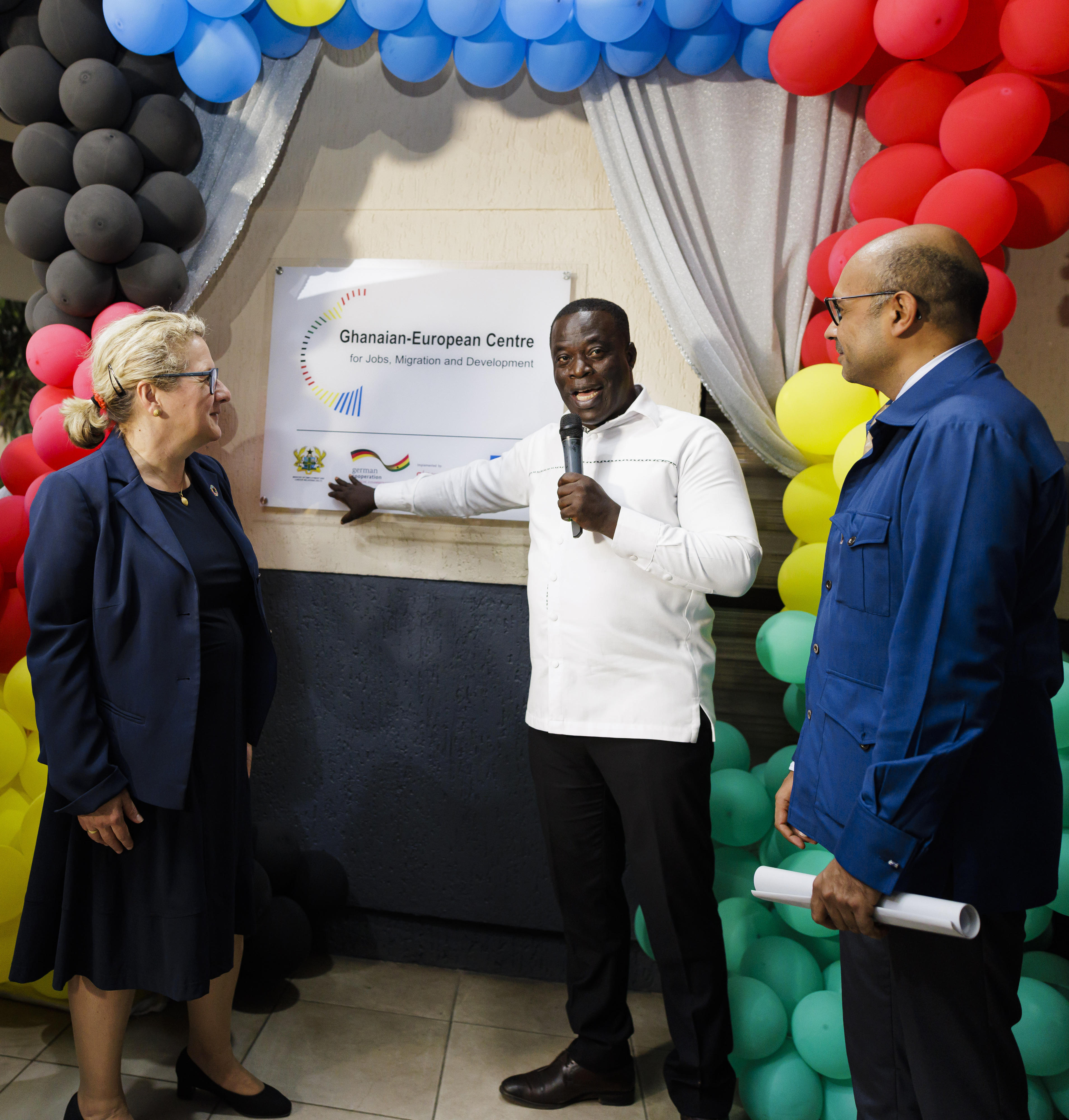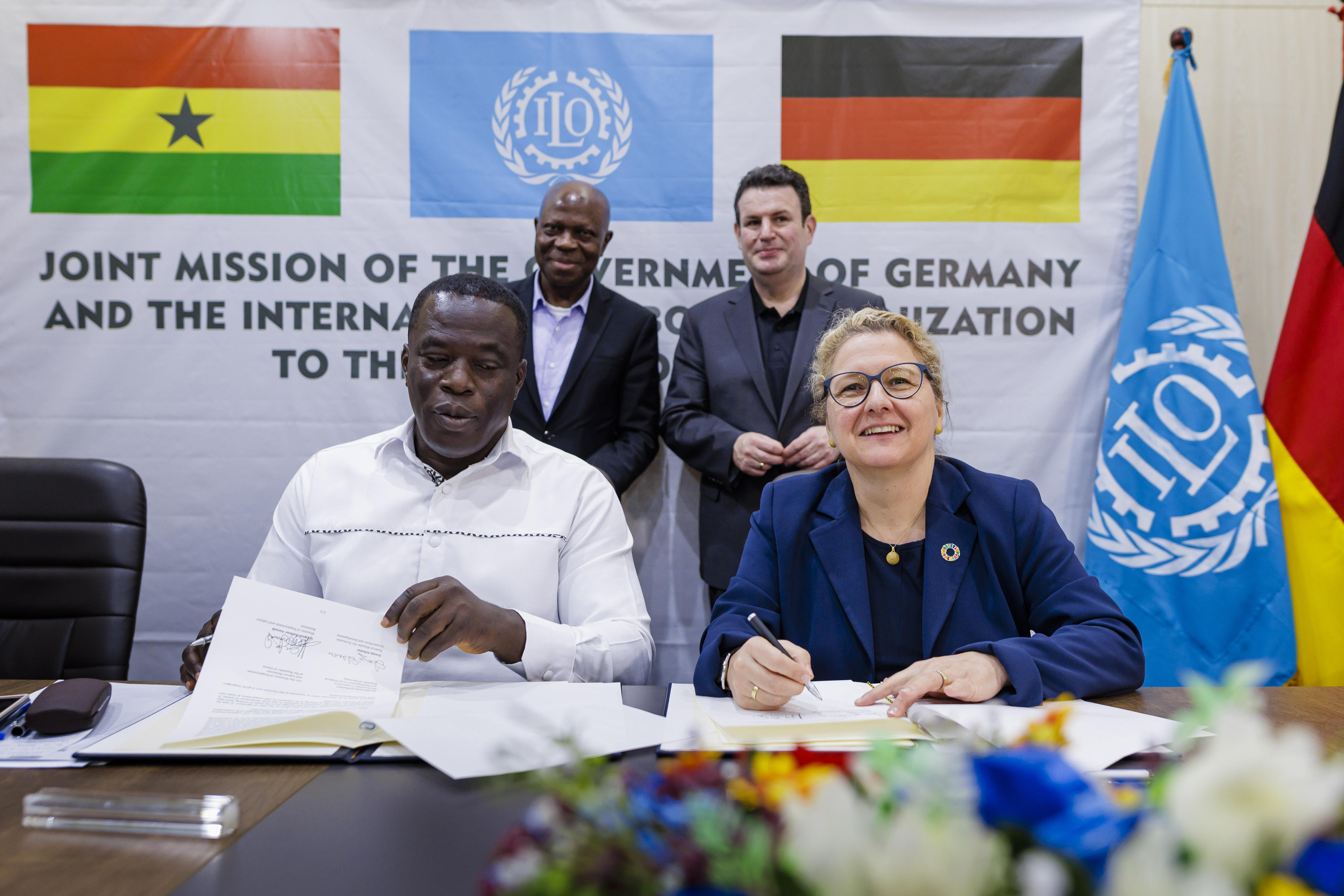Centres for Migration and Development Germany is taking a new direction in its development cooperation in the field of migration – kick off in Ghana
As part of the paradigm shift it has initiated for Germany’s migration policy, the German government is also taking a new course in its development cooperation in this field. The aim is to turn safe, regular and orderly migration to mutual advantage. During their visit to Ghana, German Development Minister Svenja Schulze and German Minister of Labour Hubertus Heil today are kick-starting this redirected policy by signing a joint declaration with the Ghanaian Minister of Labour.
The agreement is centred on developing the Ghanaian-German Centre for Jobs, Migration and Reintegration that was established in Accra in 2017 toward a comprehensive Centre for Jobs, Migration and Development. The centre in Accra is part of the broader flagship initiative Centres for Migration and Development for which the German Development Ministry (BMZ) is making 150 million euros available for three years and – at present – for nine countries. Further centres are being planned in Morocco, Tunisia, Egypt, Jordan, Nigeria, Iraq, Pakistan, and Indonesia.
German Development Minister Svenja Schulze said, “The German government has decided to bring about a paradigm shift in Germany's migration policy. This also relates to our development cooperation. Properly managed migration offers enormous potential for economic development in our partner countries, but also in Germany. While many countries, like, for example, Ghana, are faced with the challenge of creating jobs for their young and growing population, demographic change in Germany means that we are desperately looking for labour in many areas. The example of Ghana is an illustration that we can find good joint solutions to address both the situation in our partner countries and the situation in Germany. The existing Ghanaian-German migration advice centre has so far mainly assisted Ghanaian returnees with regard to reintegration. We want to turn this one-way street into a two-way street and further develop the centre for our mutual benefit. We want the centre to stand for a modern, holistic understanding of migration, with Germany not just training and attracting workers for our labour market but also helping to foster economic development in Ghana and create jobs there.”
German Labour Minister Hubertus Heil said, “Securing the supply of skilled labour secures our country’s prosperity. We must do everything we can at home and abroad to recruit skilled workers. With our Skilled Immigration Act we are establishing Europe’s most modern immigration legislation. Explaining legal paths to migration in the countries of origin is important, as is providing information on the requirements of the European labour market. The migration advice centre here plays an important role as a central contact point to get information and advice.”
The migration advice centre in the Ghanaian capital of Accra was created in 2017 as a Ghanaian-German cooperation project. Up until now, the focus has been on assisting returning migrants to reintegrate and creating opportunities on the ground by helping migrants to start a business. Under the new approach, people wishing to emigrate from Ghana are to be offered more advisory services and information on options for legal migration to Germany and the EU, but also to other African countries. The advisory services are complemented by training measures – through, for instance, closer cooperation with existing projects on vocational education and training. The BMZ is investing almost 10 million euros for the next three years in this area.
In addition, the EU is contributing almost 6 million euros. What was initially started as a German-Ghanaian cooperation project will be developed into a “Ghanaian-European Centre for Jobs, Migration and Development”.
The centre in Accra is part of the broader BMZ flagship initiative “Centres for Migration and Development” for which the BMZ is making 150 million euros available for three years. The centres are to support regular migration for work and training purposes. The main focus is on achieving development impact and ensuring that training and knowledge transfer, for example, benefit the countries of origin just as much as the destination countries and the migrants themselves. In addition, following a 360-degree approach, the centres will also provide information on the risks involved in irregular migration and assist returnees in their efforts to reintegrate. Further centres are being planned in Morocco, Tunisia, Egypt, Jordan, Nigeria, Iraq, Pakistan, and Indonesia.
The flagship initiative stands for a migration policy approach that is aimed at shaping safe, regular and orderly migration that benefits all by working through more, comprehensive migration partnerships that cover all aspects of migration: the promotion of legal migration, containment of irregular migration, return of people without residence permits and promotion of sustainable reintegration through the creation of opportunities on the ground. The BMZ is engaging to make migration in all its dimensions work for development, building on long-standing strong partnerships with many countries of origin.
The centres for migration and development are also complementing the German government's strategy for attracting skilled workers. Given demographic change, Germany has a growing need for skilled workers from abroad. Many developing countries, for their part, are facing high levels of youth unemployment and are therefore very interested in labour migration, which can provide their people with access to knowledge and international training. In Ghana, too, the drivers of migration are, in particular, low incomes, a lack of jobs for young people and a resulting high level of youth unemployment. Labour migration can be a way to take pressure off the labour market. The Ghanaian government understands the potential of labour migration, and sees how remittances and knowledge transfer, for instance, can drive socio-economic development in Ghana.

